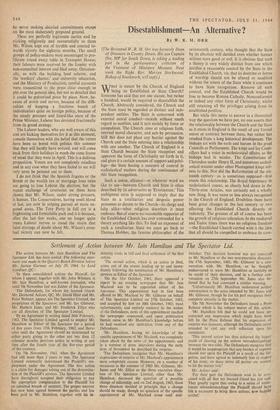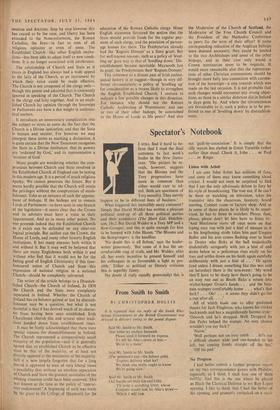Disestablishment—An Alternative ?
By W. R. M. ORR
(The Reverend W. R. M. Orr was formerly Dean of Dromore in County Down. his son Captain Orr, MP for South Down, is taking a leading part in the parliamentary criticism of the Vestment of Ministers Measure. Next week the Right Rev. Mervyn Stockwood, Bishop of Southwark, will reply.) ,
WHAT is meant by the Church of England being an Established or State Church? Someone has said that not one statute, but rather a hundred, would be required to disestablish the Church. Abstractly considered, the Church and the State must be regarded as distinct and inde- pendent entities. The State is concerned with external moral conduct—morals without much regard to motives, and it acts mainly by force or compulsion. The Church aims at religious faith, internal moral character, and acts by persuasion. Still this does not place any barrier against the Church and the State entering into a relationship with one another. The Church of England is a State Church because the State recognises and approves the form of Christianity set forth in it, and gives it a certain amount of support and privi- lege—the State having a measure of control in ecclesiastical matters during the continuance of this State recognition.
Such a union, alliance—or whatever word we like to use—between Church and State is often described by its adversaries as 'Erastianism.' This ambiguous term is supposed to imply that the State as a totalitarian and despotic power presumes to dictate to the Church—its clergy and laity alike—what religious doctrines it must embrace. But of course no reasonable supporter of the Established Church has ever contended for a theory anything like this. To find an exponent of such a totalitarian State we must go back to Thomas Hobbes, the famous philosopher of the seventeenth century, who thought that the State by its absolute will decided even whether human actions-were good or evil. It is obvious that such a theory is very widely distinct from one which justifies a reasonable control by the State in the Established Church, viz. that its doctrine or forms of worship should not be altered or modified without the assent of the State while it continues to have State recognition. Remove all such control, and the Established Church would be free to become Roman Catholic, Nonconformist or indeed any other form of Christianity, whilst still retaining all the privileges arising from its established position.
But while this seems to answer in a theoretical way the question we have put, no one asserts that the relationship between the Church and the State as it exists in England is the result of any formal union or contract between them, but rather has resulted frqm a long historical development. The bishops sat with the earls and barons in the great Councils or Parliaments. The kings and lay Coun- cillors had a voice in ecclesiastical affairs, as the bishops had in secular. The Constitutions of Clarendon under Henry II, and numerous ecclesi- astical statutes under other Plantagenet kings wit- ness to this. Nor did the Reformation of the six- teenth century—as is sometimes supposed—first create this relationship. The Royal Supremacy in ecclesiastical causes, so clearly laid down in the Thirty-nine Articles, was certainly not a wholly new thing. It was more or less always recognised in the Church of England. Doubtless these have been great changes in the last century or two affecting the Established Church directly or indirectly. The greatest of all of course has been the growth of religious toleration. In the mediawal and Tudor times there was no religious freedom —the Established Church carried with it the idea that all should be compelled to embrace its com- munion and doctrine. Step by step however this has ceased to be the case, and liberty has been extended to the Nonconformists, the Roman Catholics, the Jews—in fact to men of all religious opinions or even of none. The Established Church—like other English institu- tions—has been able to adapt itself to new condi- tions. It is no longer associated with intolerance.
The relationship of Church and State as it exists in England has always had a wide appeal to the laity of the Church, as an instrument by which their voice could be made effective. The Church is not composed of the clergy only— though this patent and admitted fact is commonly ignored in speaking of the Church. The Church is the clergy and laity together. And in an estab- lished Church lay opinion through the Sovereign or Parliament can have a due weight in ecclesias- tical matters.
It introduces an unnecessary complication into the subject to stress as some do the fact that the Church is a Divine institution, and that the State is human and secular. For however we may interpret these terms as marking a distinction, it is quite certain that the New Testament recognises the State as a Divine institution, that its powers are 'ordained by God,' and its representative a `minister of God.'
Many people are wondering whether the com- promises between Church and State involved in the Established Church of England can be lasting in this modern age. It is a period of much religious apathy. We cannot penetrate the future. But it seems hardly possible that the Church will retain the privileges without the compromises of estab- lishment. Take as an instance of such the appoint- ment of bishops. If the bishops are to remain Lords of Parliament—to have seats in one branch of the legislature—it seems clear that the Crown and its advisers must have a voice in their appointment. And so in many other points. No one pretends indeed that the Established Church as it exists can be defended on any clear-cut logical principle. But neither can the Crown, the House of Lords, and, many other historic English institutions. It has many enemies both within it and without it. But it may well be believed that there are many Englishmen both within it and without who feel that it would not be for the lasting good of English Christianity if this time- honoured union of Church and State—this expression of national religion in a national Church—should be completely subverted.
The writer of the article belongs to a Disestab- lished Church—the Church of Ireland. In 1870 the Church and the State were completely separated in Ireland. Whether the Church of Ireland has on balance gained or lost by disestab- lishment may be a question, but what is not doubtful is that it has derived much of its charac- ter from having been once established. IriSh Churchmen cherish this and several other tradi- tions handed down from establishment times.
It may be freely acknowledged that there were special reasons for disestablishment in Ireland. The Church represented a comparatively small minority of the population--and it is generally agreed that an established Church to be effective must be that of the majority, or at least not directly opposed to the sentiments of the majority. Still it is now largely forgotten that for a long Period it appeared to men of very liberal views a possibility that without an absolute separation of Church and State the greatest anomalies of the existing situation could have been removed. This was known at the time as the policy of 'concur- rent endowment.' A beginning of such was made by the grant to the College of Maynooth for the education of the Roman Catholic clergy. Many English statesmen favoured the notion that the State should provide funds for the regular pay- ment of such clergy, and the provision of parson- age houses for them. The Presbyterian already had the 'Regium Donum' as a State grant. But for well-known reasons, such as a policy of 'level- ling up' gave way to that of 'levelling down.' Dis- establishment became inevitable. Maynooth lost its grant; the Presbyterians their 'Regium Donum.'
This reference to a distant past of Irish ecclesi- astical history is to suggest—though in very dif- ferent circumstances—a policy of 'levelling up' for consideration as a means likely to strengthen the English Established Church. I venture to indicate a few possible changes in this direction. For instance, why should not the Roman Catholic Archbishop of Westminster, and one or two of their other bishops, be summoned to the House of Lords as life peers? And also
the Moderator of the Church of Scotland, the Moderator of the Free Church Council and the President of the Methodist Conference as peers for the term of their office? If some corresponding reduction of the Anglican bishops were deemed necessary, they could be limited to the two Archbishops and some of the other bishops, and in their case only would a Crown nomination seem to be requisite. It would seem reasonable also that the representa- tives of other Christian communions should be brought more fully into connection with corona- tion of the Sovereign—a step towards which was made on the last occasion. It is not probable that such changes would encounter any strong objec- tions, as those in a similar direction did in Ireland in are gone by. And where the circumstances are favourable to it, such a policy is to be pre- ferred to one of 'levelling down' by disestablish- ment.































 Previous page
Previous page